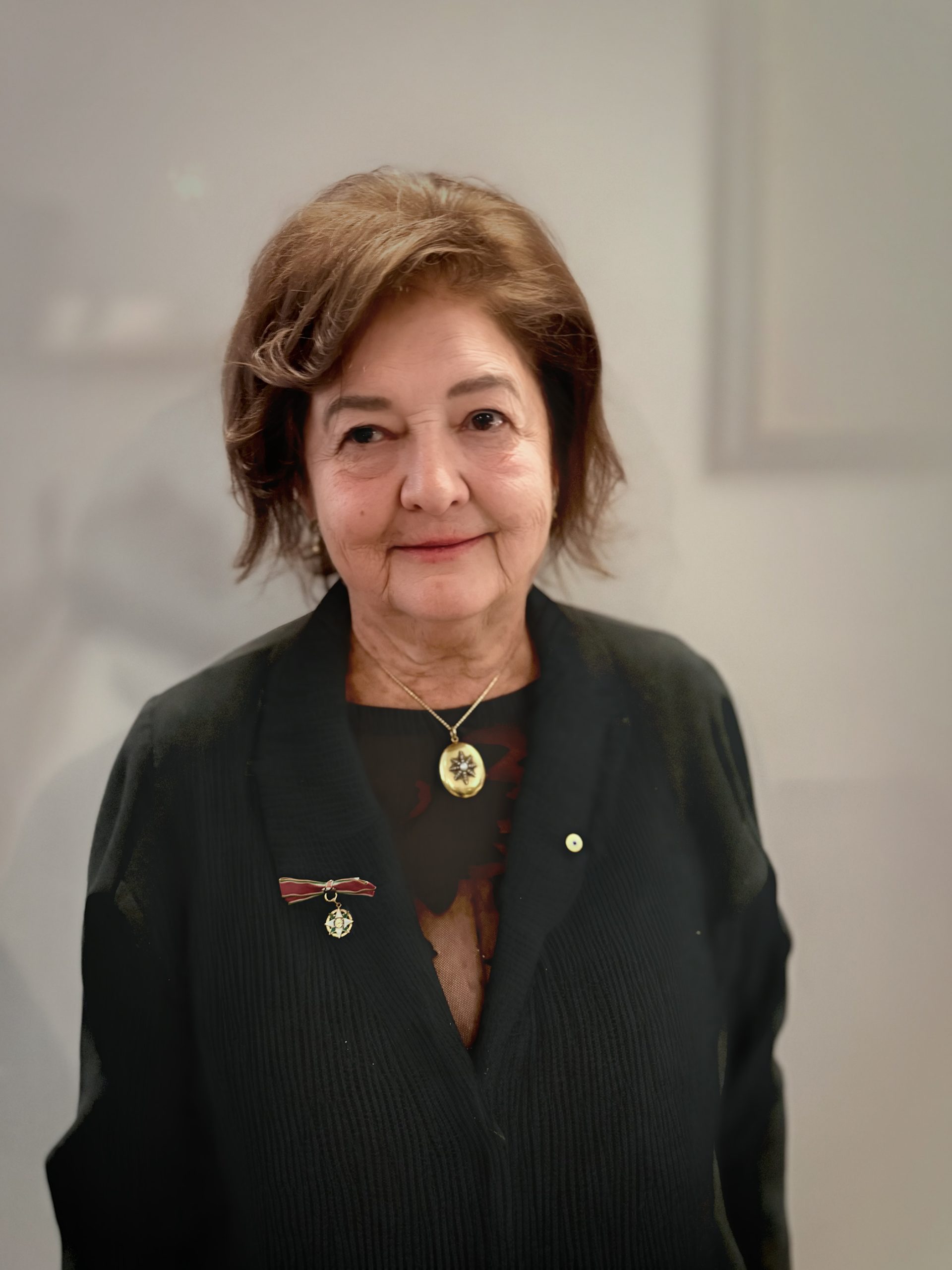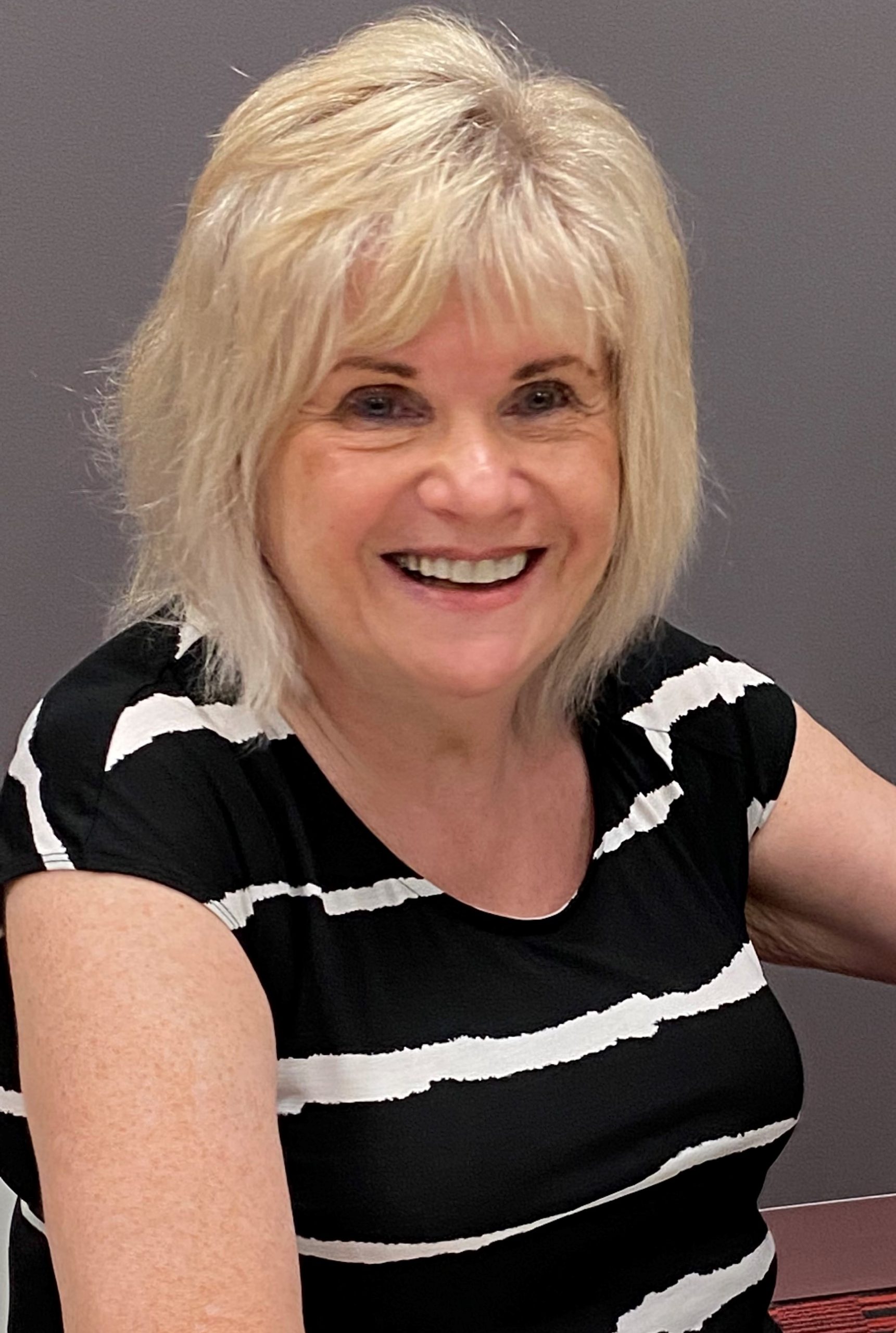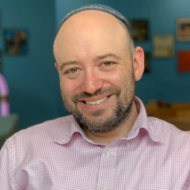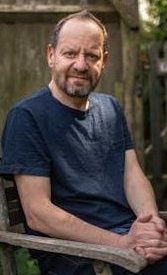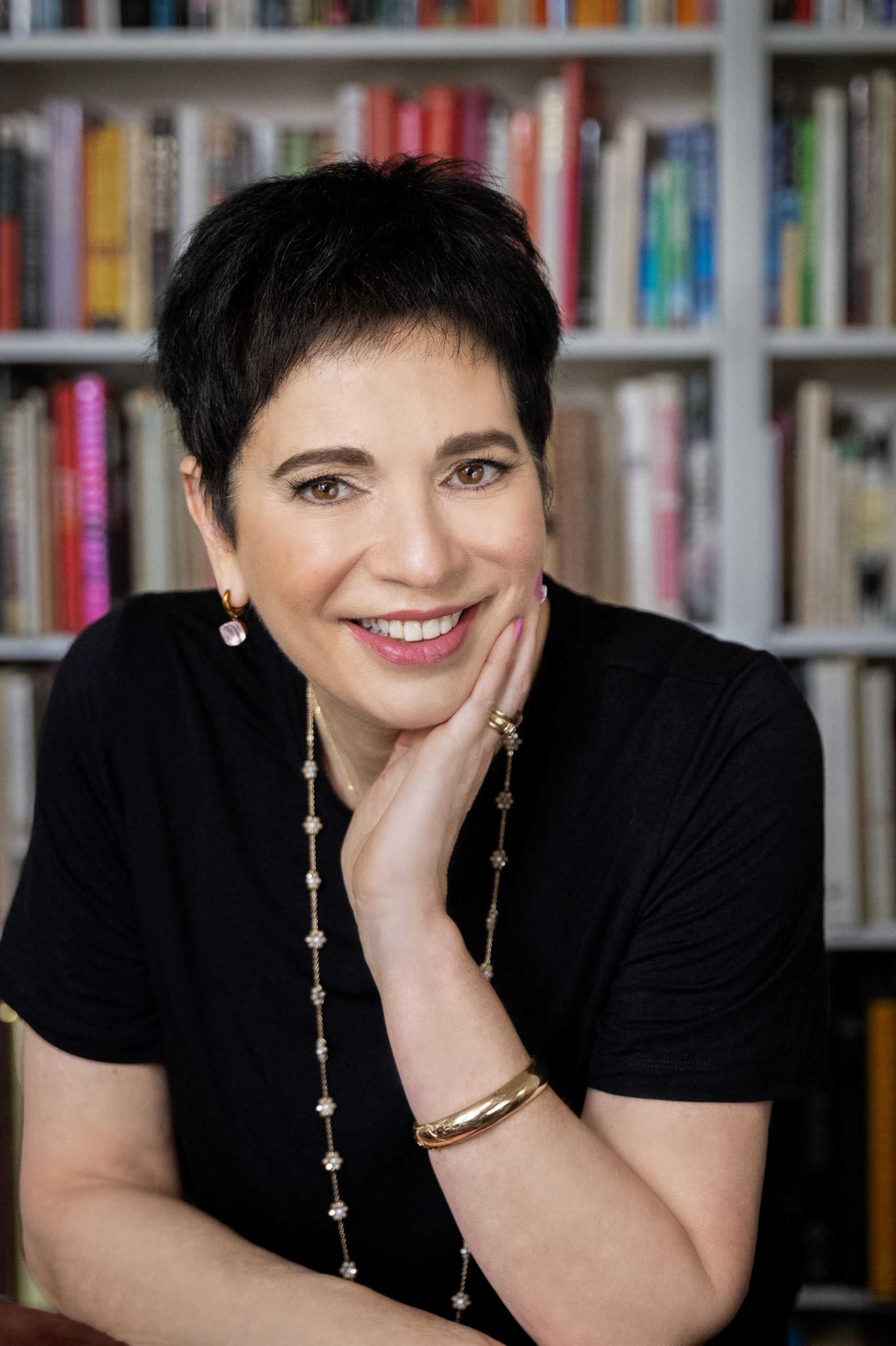Sidney Nolan: An Introduction
Sir Sidney Nolan OM AC CBE RA is an artist who has always inspired strong feelings among his admirers and detractors. In this lecture Jaynie Anderson AM OSI FAHA will challenge the conventional cliches of the biographies written about Nolan to date with reference to previously unknown archival evidence. Nolan’s relations to Jewish survivors of the Holocaust will be discussed. New documentary evidence about his admiration for Leonhard Adam and Yosl Bergner will be revealed from the time he lived in St Kilda as a child, and in Parkville in the 1940s. Adam and Bergner inspired Nolan to create works of art about Indigenous subjects which remained a lifelong preoccupation for him. The early Jewish legacy to Nolan was of continual significance and resurfaces in his preoccupation with Auschwitz.
The exhibition will be open to the public for viewing prior to the event.
Exhibition produced by:

Research and Curation: Katharine Cousins with grateful assistance from Roslyn Sugarman, Emeritus Professor Konrad Kwiet & Professor Avril Alba.
This exhibition was made possible with sincere appreciation to our partners:
- Education Heritage Foundation Ltd
- Richard and Jacqui Scheinberg
With additional thanks to our Sydney Jewish Museum donors and lenders:
- Richard and Jacqui Scheinberg
- The estate of Mary Nolan
- Neil and Kathy Miller
- Sharon Milch
- David and Jenny Goldstein
- Roland and Linda Gumbert
This exhibition follows the Museum’s 2022 exhibition ‘Shaken to His Core: The Untold Story of Nolan’s Auschwitz’, produced in collaboration with ‘Nolan’s Africa’ author, Andrew Turley. After its success in Sydney and with the acquisition of some 65 artworks from Nolan’s Holocaust series, the Sydney Jewish Museum is proud to present this exhibition featuring new insights and research into our Sidney Nolan Holocaust collection.
Image | Australian artist Sidney Nolan, taken by Albert Tucker. National Library of Victoria.
Please note this event may be recorded for our institutional archive.
Nolan at Night : FutureGen
Join us for a FutureGen event: Nolan at Night, an after-hours viewing of Aftershocks: Nolan and the Holocaust an exhibition showcasing the iconic Australian artist Sidney Nolan as he came to terms with the events of the Holocaust. This intimate event offers a unique opportunity to discover his evocative depictions of the human condition, historical narratives and the nature of memory through rare pieces. Engage with curators and immerse yourself in the stories behind each artwork on display in the Alter Family Special Exhibition Gallery. Don’t miss this unforgettable evening to experience Sidney Nolan’s art in a new light at Nolan at Night.
Exhibition produced by:

Research and Curation: Katharine Cousins with grateful assistance from Roslyn Sugarman, Emeritus Professor Konrad Kwiet & Professor Avril Alba.
This exhibition was made possible with sincere appreciation to our partners:
- Education Heritage Foundation Ltd
- Richard and Jacqui Scheinberg
With additional thanks to our Sydney Jewish Museum donors and lenders:
- Richard and Jacqui Scheinberg
- The estate of Mary Nolan
- Neil and Kathy Miller
- Sharon Milch
- David and Jenny Goldstein
- Roland and Linda Gumbert
This exhibition follows the Museum’s 2022 exhibition ‘Shaken to His Core: The Untold Story of Nolan’s Auschwitz’, produced in collaboration with ‘Nolan’s Africa’ author, Andrew Turley. After its success in Sydney and with the acquisition of some 65 artworks from Nolan’s Holocaust series, the Sydney Jewish Museum is proud to present this exhibition featuring new insights and research into our Sidney Nolan Holocaust collection.
Image | Australian artist Sidney Nolan, taken by Albert Tucker. National Library of Victoria.
Echoes of Justice: The Eichmann Trial and Holocaust Memory in Australia
Join us for a compelling discussion exploring how the 1961 televised trial of Adolf Eichmann reverberated across Australian society. Eichmann, a key architect of the Holocaust, was responsible for organizing the logistics of mass deportations to Nazi death camps. Though geographically distant, Australia was deeply connected to the Holocaust through its large survivor community. The trial – centered on survivor testimony rather than the perpetrator – marked a global shift in Holocaust consciousness. In Melbourne, it sparked greater public engagement with Holocaust memory, influencing commemorations, media, and even local art, including works by Sidney Nolan now on display at the Melbourne Holocaust Museum.
Exhibition produced by:

Research and Curation: Katharine Cousins with grateful assistance from Roslyn Sugarman, Emeritus Professor Konrad Kwiet & Professor Avril Alba.
This exhibition was made possible with sincere appreciation to our partners:
- Education Heritage Foundation Ltd
- Richard and Jacqui Scheinberg
With additional thanks to our Sydney Jewish Museum donors and lenders:
- Richard and Jacqui Scheinberg
- The estate of Mary Nolan
- Neil and Kathy Miller
- Sharon Milch
- David and Jenny Goldstein
- Roland and Linda Gumbert
This exhibition follows the Museum’s 2022 exhibition ‘Shaken to His Core: The Untold Story of Nolan’s Auschwitz’, produced in collaboration with ‘Nolan’s Africa’ author, Andrew Turley. After its success in Sydney and with the acquisition of some 65 artworks from Nolan’s Holocaust series, the Sydney Jewish Museum is proud to present this exhibition featuring new insights and research into our Sidney Nolan Holocaust collection.
Image | Australian artist Sidney Nolan, taken by Albert Tucker. National Library of Victoria.
-
Dr Margaret Taft
-
Dr Simon Holloway
An Evening with Philippe Sands KC : 38 Londres Street
Join us for An Evening with Philippe Sands KC: 38 Londres Street: On Impunity, Pinochet in England, and a Nazi in Patagonia, a powerful exploration of justice, memory, and identity. Internationally acclaimed author and human rights lawyer Philippe Sands KC shares riveting insights from his latest work. In this distinctive mix of memoir, courtroom drama, and travel narrative, Philippe Sands offers an insider’s view of the Pinochet trial—where he served as a barrister representing Human Rights Watch—and unravels the surprising link between the Chilean dictator and a prominent Nazi who found himself running a king crab cannery in Patagonia.
This one-night-only event promising a thought-provoking conversation and unique storytelling experience. Don’t miss the chance to engage with one of the world’s leading legal minds
Please note this event may be recorded for our institutional archive.
Nolan at Night
Join us for Nolan at Night, an after-hours viewing of Aftershocks: Nolan and the Holocaust an exhibition showcasing the iconic Australian artist Sidney Nolan as he came to terms with the events of the Holocaust. This intimate event offers a unique opportunity to discover his evocative depictions of the human condition, historical narratives and the nature of memory through rare pieces. Engage with curators and immerse yourself in the stories behind each artwork. Don’t miss this unforgettable evening to experience Sidney Nolan’s art in a new light at Nolan at Night.
Exhibition produced by:

Research and Curation: Katharine Cousins with grateful assistance from Roslyn Sugarman, Emeritus Professor Konrad Kwiet & Professor Avril Alba.
This exhibition was made possible with sincere appreciation to our partners:
- Education Heritage Foundation Ltd
- Richard and Jacqui Scheinberg
With additional thanks to our Sydney Jewish Museum donors and lenders:
- Richard and Jacqui Scheinberg
- The estate of Mary Nolan
- Neil and Kathy Miller
- Sharon Milch
- David and Jenny Goldstein
- Roland and Linda Gumbert
This exhibition follows the Museum’s 2022 exhibition ‘Shaken to His Core: The Untold Story of Nolan’s Auschwitz’, produced in collaboration with ‘Nolan’s Africa’ author, Andrew Turley. After its success in Sydney and with the acquisition of some 65 artworks from Nolan’s Holocaust series, the Sydney Jewish Museum is proud to present this exhibition featuring new insights and research into our Sidney Nolan Holocaust collection.
Image | Australian artist Sidney Nolan, taken by Albert Tucker. National Library of Victoria.
Hear a Witness: Dr Henry Ekert AM
Join us at the Melbourne Holocaust Museum for a rare opportunity to hear first-hand from Holocaust survivor Dr Henry Ekert AM.
Henry was born in Przemysl, Poland in 1936.
He was 4 years old when the Nazis invaded and occupied Poland.
Henry and his parents were forced to live in the Przemysl Ghetto. Henry’s first experience of death was with his grandmother; it was the first of many horrors he witnessed throughout the war.
Henry was smuggled out of the ghetto and moved through several hiding places, including living with his father in a cupboard for six weeks.
Eventually, a man named Henek helped the family to hide and arranged for his father to work in Krakow. Henry spent time hiding with one of his parents and on his own. Henry regards Hanek and his sister Aunty Bola as their saviours.
Henry and his parents were reunited after the war and arrived in Australia 1949.
Join us on the 18th of May to meet Henry and learn about his experiences.
Image | Simon Shiff
Nolan at Night : FutureGen
Join us for a Future Gen event: Nolan at Night, an after-hours viewing of Aftershocks: Nolan and the Holocaust an exhibition showcasing the iconic Australian artist Sidney Nolan as he came to terms with the events of the Holocaust. This intimate event offers a unique opportunity to discover his evocative depictions of the human condition, historical narratives and the nature of memory through rare pieces. Engage with curators and immerse yourself in the stories behind each artwork on display in the Alter Family Special Exhibition Gallery. Don’t miss this unforgettable evening to experience Sidney Nolan’s art in a new light at Nolan at Night.
Exhibition produced by:

Research and Curation: Katharine Cousins with grateful assistance from Roslyn Sugarman, Emeritus Professor Konrad Kwiet & Professor Avril Alba.
This exhibition was made possible with sincere appreciation to our partners:
- Education Heritage Foundation Ltd
- Richard and Jacqui Scheinberg
With additional thanks to our Sydney Jewish Museum donors and lenders:
- Richard and Jacqui Scheinberg
- The estate of Mary Nolan
- Neil and Kathy Miller
- Sharon Milch
- David and Jenny Goldstein
- Roland and Linda Gumbert
This exhibition follows the Museum’s 2022 exhibition ‘Shaken to His Core: The Untold Story of Nolan’s Auschwitz’, produced in collaboration with ‘Nolan’s Africa’ author, Andrew Turley. After its success in Sydney and with the acquisition of some 65 artworks from Nolan’s Holocaust series, the Sydney Jewish Museum is proud to present this exhibition featuring new insights and research into our Sidney Nolan Holocaust collection.
Image | Australian artist Sidney Nolan, taken by Albert Tucker. National Library of Victoria.
Melbourne Holocaust Museum x ABC Radio National Soul Search
Join us for an exciting opportunity to be part of an episode of ABC Radio National’s Soul Search at the Melbourne Holocaust Museum. We’re exploring the powerful theme of liberation, reflecting on its significance and impact 80 years since the end of World War II. This is a unique chance to engage in thought-provoking conversation, share your perspectives, and learn from incredible Holocaust survivor stories of resilience and hope. Don’t miss out—come be part of something special and meaningful!
Please note this session is recorded.
REMEMBERING THE PAST, SHAPING THE FUTURE: Yom HaShoah 2025
In partnership with AUJS and AZYC, we invite you to join us this Yom HaShoah, Thursday, April 24th, for an interactive commemoration. Experience the newly redeveloped museum, hear firsthand testimony from Holocaust survivor Dr. Henry Ekert AM, and participate in a meaningful discussion session.
Below is the schedule of events:
5:00 PM: Optional viewing of the “Everybody Had A Name” permanent exhibition.
6:00 PM – 6:45 PM: Formal program, including testimony from a Holocaust survivor.
7:00 PM – 7:45 PM: Breakout room discussion sessions.
Please select one session that interests you from the available options.
Note: As all sessions are held simultaneously, you may only attend one.
Session 1 – Never Again
What does “never again” mean in 2025, using the lessons learned from the Holocaust?
Session 2 – Connections
Share your personal Holocaust connection and reflect on how it impacts you today and shapes your future.
Session 3 – Preserving Memory
How do you preserve and memorialize your family’s Holocaust history?
Short Course: Liberation and the End of the Holocaust
Please join us for our four-week Liberation and the End of the Holocaust course.
From 1944, as the German army was retreating, Allied forces came inexorably closer to Germany. Along the way, they uncovered scenes of horrifying atrocities: mass graves, burned-out villages and camps populated by people who seemed more dead than alive. These settings became the backdrop for a new genre of Western and Soviet propaganda, justifying their war against Germany and calling for other countries to assist in the intake of new refugees. For some of those refugees, the situation was particularly dire. Survivors of genocide, they had no homes to return to nor knowledge of the whereabouts of their family. For many Jewish survivors in particular, Displaced Persons (DP) Camps were to become their homes for many years, and would serve as the sites of a cultural and spiritual renaissance. In this course, coinciding with the 80th anniversary of the liberation of the camps, we look at the process by which camps were liberated, the nature of the DP camps that were then established, and the enduring impact of this period on our understanding of the Holocaust.
Week One: “The Literature of Liberation”: Dr Breann Fallon.
Week Two: “The End of the War”: Sue Hampel OAM.
Week Three: “Life in the Displaced Persons Camps”: Sue Hampel OAM.
Week Four: “What We Did Not See”: Dr Simon Holloway.
If you have any further questions about the course, please contact simon.holloway@mhm.org.au for further information.
Please register in advance and secure a place.
Image | Children from Adriatica DP Camp, Italy, travelling to Milan, c.1947. From the MHM Collection, Charles German Collection, Object ID 1691-17.
Hear a Witness: Paul Grinwald
Join us at the Melbourne Holocaust Museum for a rare opportunity to hear first-hand from Holocaust survivor Paul Grinwald.
Paul was born in Paris in 1933.
He was 7 years old when the Nazis occupied Paris. Paul and his family moved to the unoccupied part of France and he and his sister were sent to work on various farms pretending to be Christians. His scariest time was when he was separated from his parents and he didn’t know if they were alive. There were many kind people who assisted Paul and his family during their ordeal, without whom they likely would not have survived.
Paul and his sister were reunited with their parents and moved back to Paris in 1945.
Paul arrived in Australia with his family in 1949.
Join us on the 30th of March to meet Paul and learn about his experiences.
Image | Simon Shiff
A Jewish Family in Northeast Italy: A Story Rediscovered
Please join us for a lecture by Denis Passalent.
Denis will be sharing his personal story about the Gentilli Family.
Moisè Vittorio Gentilli was born in Mereto di Tomba (UD) in 1894, where his parents moved a year before from San Daniele del Friuli. He continued his father’s grocery business in the small village. He married Norma Stella Colombo in 1921. In 1930 the couple moved to Venice where they directed the local Jewish Nursing Home. On 2nd December 1943 they were arrested in Olgiate Comasco, while trying to escape to Switzerland. Deported temporarily to Fossoli, they were sent to Auschwitz in February 1944 with five other close relatives.
They never came back.
Denis decided to investigate the experiences of this family, “because their life and their tragedy must not be forgotten”
Image | Davide Merello’s illustration
Irena’s Gift: Karen Kirsten in conversation with Dr Simon Holloway
Award-winning author Karen Kirsten’s book is the captivating account of her quest to piece together her family’s hidden history.
Karen will be discussing her mother’s remarkable story of Holocaust survival after she was born in the Warsaw ghetto and smuggled out in a backpack, and the letter her mother received in Melbourne when she was thirty-two that shattered everything she thought she knew about herself and her family. A story of love and trauma, Karen’s experiences will resonate especially with those familiar with the silences that pervade the homes of Holocaust survivors.
Image | Courtesy of Imperial War Museum London
Behind the scenes tour of Underground: The Hidden Archive of the Warsaw Ghetto
Join a MHM expert for a tour of Underground: The Hidden Archive of the Warsaw Ghetto. Explore the exhibition with one of our expert team, hear about the process of bringing these rare artefacts to Melbourne and the stories behind this collection.
On display for the first time outside of Europe, Underground exhibits rare artefacts from the hidden archive of the Warsaw Ghetto. This archive was led by historian Emanuel Ringelblum who initiated an unprecedented campaign to collect material in the ghetto—the collection today known as the Ringelblum Archive. This collective of academics, writers, and activists working secretly in the first attempt to document the German-initiated mass murder of European Jews as it was happening. The exhibition brings home to the viewer the act of resistance that the underground archive of the Warsaw Ghetto constituted—a never-ending, arduous, harrowing but ultimately successful attempt to write the story of the Holocaust from the perspective of its victims.
Please select a date
Underground: The Hidden Archive of the Warsaw Ghetto is presented in partnership with the Jewish Historical Institute, Poland, the Association of the Jewish Historical Institute of Poland, and the Munich Documentation Center for the History of National Socialism, Germany.

Exhibition Sponsors
The Melbourne Holocaust Museum would like to thank our exhibition sponsors
- Gerry and Lillian Pearce
- The Embassy for the Federal Republic of Germany
Programming Sponsors
The Melbourne Holocaust Museum would like to thank our programming sponsors
- The Jewish Quarterly
- The Australian Centre for Jewish Civilisation, Monash University
The Secret Archive: Women in the Ghetto
For many years, historians of the Holocaust focused exclusively on the experiences of men: men who were in hiding, who were deported to camps, who languished in ghettos or who took up arms and fought. We know – both from the historical record and from the testimony of survivors – that women experienced the same things in fundamentally different ways, and at times experienced fundamentally different tribulations. Join us for this lecture delivered by Dr Simon Holloway will look at the Holocaust through a “herstory” lens: in what ways did women experience the Warsaw Ghetto and in what ways did they resist? Special attention will be given to the evidence from the secret archive of the Warsaw Ghetto, some of which will be on display in our Underground exhibit.
This talk is presented as part of the public programming running alongside the Melbourne Holocaust Museum’s inaugural special exhibition in the new Alter Special Exhibitions Gallery – Underground: The Secret Archive of the Warsaw Ghetto.On display for the first time outside of Europe, Underground exhibits rare artefacts from the hidden archive of the Warsaw Ghetto. This archive was led by historian Emanuel Ringelblum who initiated an unprecedented campaign to collect material in the ghetto—the collection today known as the Ringelblum Archive. This collective of academics, writers, and activists working secretly in the first attempt to document the German-initiated mass murder of European Jews as it was happening. The exhibition brings home to the viewer the act of resistance that the underground archive of the Warsaw Ghetto constituted—a never-ending, arduous, harrowing but ultimately successful attempt to write the story of the Holocaust from the perspective of its victims
Underground is on display at the Melbourne Holocaust Museum from 17 November 2024 to 30 March 2025.
Underground: The Hidden Archive of the Warsaw Ghetto is presented in partnership with the Jewish Historical Institute, Poland, the Association of the Jewish Historical Institute of Poland, and the Munich Documentation Center for the History of National Socialism, Germany.

The Secret Archive: Spiritual Life in the Warsaw Ghetto
The Nazi assault against Jewish people was in equal parts an assault against what they perceived to be the spirit of Judaism. Synagogues and study houses were desecrated or destroyed, and Jews whose manner of dress indicated that they were religious faced humiliation and violence. In the face of this onslaught, many nonetheless found ways of spiritually resisting. In this lecture, Simon Holloway will address the nature of religious life during the Holocaust, with a particular focus on the ghetto in Warsaw. Special attention will be given to the secret archive of the Warsaw Ghetto, some of which will be on display in our Underground exhibit.
This talk is presented as part of the public programming running alongside the Melbourne Holocaust Museum’s inaugural special exhibition in the new Alter Special Exhibitions Gallery – Underground: The Secret Archive of the Warsaw Ghetto.On display for the first time outside of Europe, Underground exhibits rare artefacts from the hidden archive of the Warsaw Ghetto. This archive was led by historian Emanuel Ringelblum who initiated an unprecedented campaign to collect material in the ghetto—the collection today known as the Ringelblum Archive. This collective of academics, writers, and activists working secretly in the first attempt to document the German-initiated mass murder of European Jews as it was happening. The exhibition brings home to the viewer the act of resistance that the underground archive of the Warsaw Ghetto constituted—a never-ending, arduous, harrowing but ultimately successful attempt to write the story of the Holocaust from the perspective of its victims.
Underground is on display at the Melbourne Holocaust Museum from 17 November 2024 to 30 March 2025.
Image | Religious Jews captured by the SS during the Warsaw Ghetto Uprising. The German caption reads: “Jewish rabbis”. Courtesy USHMM.
Underground: The Hidden Archive of the Warsaw Ghetto is presented in partnership with the Jewish Historical Institute, Poland, the Association of the Jewish Historical Institute of Poland, and the Munich Documentation Center for the History of National Socialism, Germany.

Hear a Witness: Sarah Saaroni OAM
Join us at the Melbourne Holocaust Museum for a rare opportunity to hear first-hand from Holocaust survivor Sarah Saaroni OAM.
Sarah was born in Lublin, Poland in 1926. Soon after the German invasion her family moved into the Lublin Ghetto. When deportations began Sarah and her family went into hiding in a nearby village.
Her parents told her to pretend to be Christian and go with other Poles to work in Germany.
For the next few years Sarah lived under false identities as a Christian labourer. She escaped capture several times. At the end of the war Sarah returned to Lublin but found no family there. She eventually reunited with one brother.
Sarah met her husband in 1946. They married in 1948, where another brother had lived since before the war. Sarah arrived in Australia in 1953.
Join us on the 23rd of February to meet Sarah and learn about her experiences.
Image | photographed by Simon Shiff
The Secret Archive: Children of the Ghetto
It is a sad but simple truth: the overwhelming majority of Jewish children in Poland did not survive the Holocaust. While the manner in which those children perished has long occupied the attention of historians, we must also consider how they lived.
Looking at Warsaw in particular, this standalone lecture delivered by Simon Holloway will consider the peculiar circumstances that pertained to children: the games they played, the skills they learned, those who looked out for them and those concerning whom they needed to beware. Special attention will be given to the evidence from the secret archive of the Warsaw Ghetto, some of which will be on display in our Underground exhibit.
This talk is presented as part of the public programming running alongside the Melbourne Holocaust Museum’s inaugural special exhibition in the new Alter Special Exhibitions Gallery – Underground: The Hidden Archive of the Warsaw Ghetto.
On display for the first time outside of Europe, Underground exhibits rare artefacts from the hidden archive of the Warsaw Ghetto. This archive was led by historian Emanuel Ringelblum who initiated an unprecedented campaign to collect material in the ghetto—the collection today known as the Ringelblum Archive. This collective of academics, writers, and activists working secretly in the first attempt to document the German-initiated mass murder of European Jews as it was happening. The exhibition brings home to the viewer the act of resistance that the underground archive of the Warsaw Ghetto constituted—a never-ending, arduous, harrowing but ultimately successful attempt to write the story of the Holocaust from the perspective of its victims.
Underground is on display at the Melbourne Holocaust Museum from 17 November 2024 to 30 March 2025.
Underground: The Hidden Archive of the Warsaw Ghetto is presented in partnership with the Jewish Historical Institute, Poland, the Association of the Jewish Historical Institute of Poland, and the Munich Documentation Center for the History of National Socialism, Germany.

